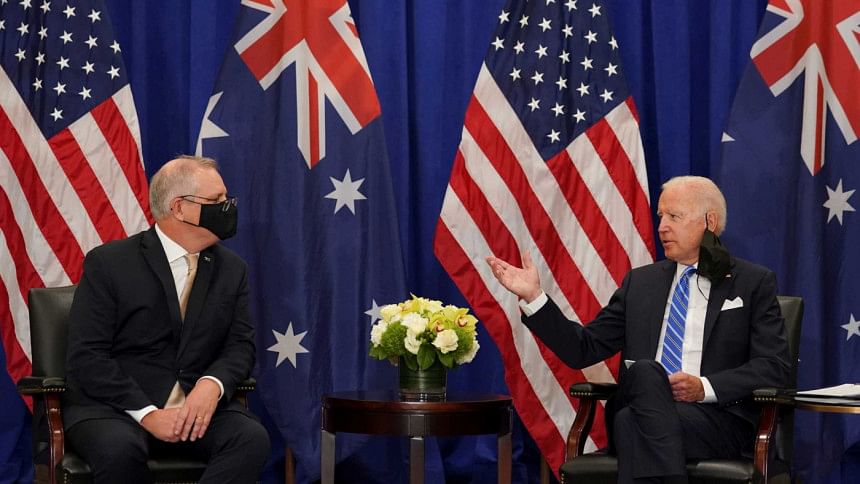The false promise of AUKUS

The geopolitical story of the last few years has featured Western democracies' gradual awakening to the realities of an increasingly ambitious and authoritarian China. European countries have gone from competing with each other to be China's best friend, to sharing the view that China represents a profound, multifaceted challenge.
For example, on global issues such as climate change, European governments must now find a way to work effectively with a difficult partner. On economic and technological issues such as artificial intelligence, China has emerged as a fierce competitor. And on human rights, democracy, and the role of the state in the economy, it is now seen as a "systemic rival."
In addition to becoming more realistic about China, Europeans are also becoming more engaged with Asia. France led the pack in 2016 by signing a deal to provide Australia with its diesel-powered Barracuda submarines, and by inspiring the rest of Europe to develop a new strategy for the Indo-Pacific region. Its position on China in recent years has been light years away from that of British Prime Minister Tony Blair, French President Jacques Chirac, and German Chancellor Gerhard Schröder, who supported ending a European Union embargo on arms sales to China and granting the country "market economy status."
But now France has been shoved aside by AUKUS, a new security and technology alliance between the United States, Australia, and the United Kingdom. In Washington and London, this deal to provide Australia with US-made nuclear submarines is being framed as one of the most significant strategic advances in decades, even though it has infuriated France.
For the US, AUKUS comes hot on the heels of its chaotic withdrawal from Afghanistan, and thus is being held up as evidence that the Biden administration is serious, competent, and tough on foreign policy. Furnishing Australia with a nuclear-powered submarine fleet will significantly extend America's own ability to project power in the Indo-Pacific—hence China's displeasure at the pact.
AUKUS is also the first and (so far) only expression of "Global Britain," the newly empowered global player that was supposed to arise after Brexit. The deal is being touted as proof that the UK's "special relationship" with the US is robust. Even the French could benefit from the new arrangement. By pointing to yet another example of American flakiness, France can bolster its own case for pursuing European strategic autonomy.
Since the news of the deal broke, there have been attempts to lower the temperature between Western powers. US President Joe Biden has called French President Emmanuel Macron, admitted that the "situation would have benefited from open consultations among allies," and promised more US support for France's anti-terrorism campaign in the Sahel.
Now that the French have blown off some steam (by temporarily recalling their ambassadors to the US and Australia), many American foreign policy observers seem to think that there will be a return to business as usual. Yet, whatever tactical advances that the US, the UK, and Australia may have made, the strategic gains to be had from AUKUS are dubious at best.
Yes, the Indo-Pacific is central to America's competition with China, and a well-equipped Australia can enhance US naval control over that theatre. But there are other, more important battlegrounds to consider. As we have seen, the China challenge is also about the regulation of artificial intelligence, global finance, and green technologies and infrastructure. On these issues, the EU has far more to contribute than Australia or the UK does.
It is in America's own long-term interest that the EU become more of a sovereign power capable of participating in the defence of shared Western values and interests. By humiliating France, the one EU member state that has openly embraced deeper engagement in the Indo-Pacific, the Biden administration has made this outcome less likely.
And the UK has been no less myopic. Having left the EU, it is struggling to develop relationships with other countries that have less in common with it than its immediate European neighbours. Even a committed Brexiteer would have trouble arguing that Australia is more important to British military and trade interests than are France or other continental Europeans. It is not Australia that can help the UK by providing emergency truck drivers or stemming the flow of migrants across the English Channel.
But the French are not blameless. Most other EU members see France's foreign policy agenda as ultimately anti-American, so the best way to bring them along would be to convince them otherwise. Reducing Europe's dependence on the US thus should be framed as a pro-American project that will help both Europe and the US confront the challenges of the 21st century. By precipitating a major transatlantic spat and confirming EU Atlanticists' suspicion that it harbours anti-American resentment, France has undercut its own goals.
It is not too late to realign the various strategies being pursued by Western powers. France, the UK, and the US may have generated headlines with moves that feel tactically savvy and emotionally satisfying, but China may turn out to be the strategic winner. Rather than fighting over submarines, Western democracies should be exploring how their Indo-Pacific strategies might complement one another on other critical fronts, such as the digital economy, trade, and climate change. Achieving that kind of alignment could provide a foundation for bringing on other major partners, such as Japan, South Korea, and India.
China's response to AUKUS implicitly acknowledges this. It has applied to join the Comprehensive and Progressive Agreement for Trans-Pacific Partnership (CPTPP)—a major deal that was originally promoted by the Obama administration to contain China's economic rise. In the decade since its negotiation, the US has lost its interest in trade deals, and China has been exploiting its retreat from the global stage. China's cynical move to take America's place in the CPTPP shows a ruthless pragmatism that could leave Western approaches—including AUKUS—looking flat-footed.
Mark Leonard is co-founder and director of the European Council on Foreign Relations, and the author of "The Age of Unpeace."
Copyright: Project Syndicate, 2021
www.project-syndicate.org
(Exclusive to The Daily Star)

 For all latest news, follow The Daily Star's Google News channel.
For all latest news, follow The Daily Star's Google News channel. 



Comments